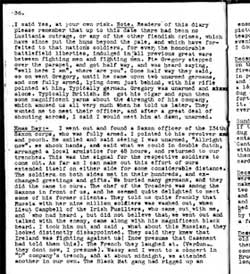Britain's World War I diaries go online

Spanning the whole of the 1914-18 conflict, the diaries are the official record of the war by British army units, but deeply poignant testimony can be found among the battalions' day-to-day accounts of their movements.
"I have never spent - or cannot imagine spending - a more ghastly and heart-tearing forty-eight hours than the last," writes Captain James Patterson in an entry from the French trenches dated 16 September, 1914.
"Swarms of Germans on the ridge, rather massed. Our guns open on them at 1,800 yards and one can see a nasty sight through one's glasses. Bunches of Germans blown to pieces," records the entry.
The yellowing pages of Patterson's diary are among some 2,000 files published online on Tuesday (11 January) by Britain's National Archives, as part of a project that will eventually see some 1.5m similar documents made available on the Internet.
"A lot of people think that a unit war diary will only mention places and dates and activities, but there are lots and lots of different stories among these records," said William Spencer, the archives' principal military specialist.
"By digitising them, we not only preserve them for future generations, we also make them available in a new way," he said.
The archives are urging volunteers to help them catalogue the contents of the diaries as part of "Operation War Diary" (Operation War Diary), a joint project with London's Imperial War Museum and Zooniverse, a citizen science project.
Members of the public will be able to tag key details mentioned on the online pages - such as names, places and dates - with the aim of making the diaries searchable for everyone from academics to family tree researchers.
Organisers say the work of these "citizen historians" is crucial because the service records of many of the troops mentioned in the diaries were destroyed by bombing during World War II.

Patterson's own neatly typewritten diary, recording the movements of the 1st Battalion South Wales Borderers, comes to an abrupt end on 25 October, 1914, when he was killed just three months into the war.
His diary had recorded scenes "beyond description".
"Poor fellows shot dead are lying in all directions," he wrote. "Everywhere the same hard, grim, pitiless sign of battle and war."
He describes his terror of firing into the night, writing: "One is very likely to kill one's own men, and from wounds I have seen since, I am sure some of them were hit like this."
The diaries also describe lighter moments among the troops, such as rugby matches and tugs-of-war.
"A somewhat scrappy game, ending in a draw," reads the official account of one rugby match.
Another diary entry -- part of a batch yet to be published -- describes the exploits of one Reverend Tron, chaplain to some of the battalions.
"The padre repeatedly struck the German in the face until they broke apart," reads the entry. "Unslinging his glasses, the German thrust them into the hands of the astonished clergyman, and tended his surrender."
Luke Smith of the Imperial War Museum said the work of volunteers in sorting through the diaries would help piece together the stories of the priest and thousands of others who served in the war.
"By working with citizen historians, we're going to find all the references to Reverend Tron and the half-a-million or so other named people in those diaries," he said.
"We're going to uncover the story of the Western Front at an unprecedented level of detail," Smith added.
Source: AFP via I-Net Bridge
Source: I-Net Bridge

For more than two decades, I-Net Bridge has been one of South Africa’s preferred electronic providers of innovative solutions, data of the highest calibre, reliable platforms and excellent supporting systems. Our products include workstations, web applications and data feeds packaged with in-depth news and powerful analytical tools empowering clients to make meaningful decisions.
We pride ourselves on our wide variety of in-house skills, encompassing multiple platforms and applications. These skills enable us to not only function as a first class facility, but also design, implement and support all our client needs at a level that confirms I-Net Bridge a leader in its field.
Go to: http://www.inet.co.za



